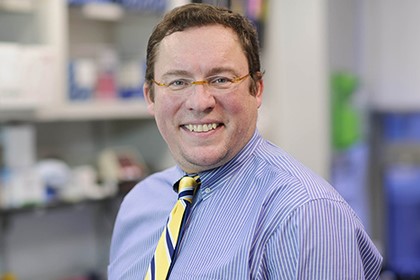Renier Brentjens, M.D., Ph.D., director of cellular therapeutics in the Human Oncology and Pathogenesis Program at Memorial Sloan Kettering Cancer Center, presented the 5th Annual Stetson Lecture in Technological Advances in Medicine via Zoom on September 8. He discussed “CARs and Armored CARs: Improving CAR T Cell Therapy for Cancer.”

Renier Brentjens, M.D., Ph.D. (Courtesy photo)
The Larner College of Medicine was honored to present the 5th Annual Stetson Lecture in Technological Advances in Medicine on September 8, 2020 via Zoom. This year’s invited speaker, Renier Brentjens, M.D., Ph.D., director of cellular therapeutics in the Human Oncology and Pathogenesis Program at Memorial Sloan Kettering Cancer Center (MSKCC), discussed “CARs and Armored CARs: Improving CAR T Cell Therapy for Cancer.”
Brentjens received his M.D. and Ph.D. degrees from SUNY Buffalo and completed an internal medicine residency at Yale and a medical oncology fellowship at MSKCC. Currently, he serves as an attending physician on the leukemia service at MSKCC, where he also runs a lab focused on developing novel treatment approaches for certain leukemias and lymphomas utilizing the patient’s own immune system. As a medical oncology fellow, Brentjens initiated the early pre-clinical studies demonstrating the potential clinical application of autologous T cells genetically modified to target the CD19 antigen through the retroviral gene transfer of artificial T cell receptors termed chimeric antigen receptors (CARs). As a principal investigator, he has successfully translated these studies to the clinical setting, treating patients with chronic lymphocytic leukemia and B cell acute lymphoblastic leukemia. Ongoing pre-clinical research in his lab is focused on the further development of CAR modified T cells designed to overcome the hostile immunosuppressive tumor microenvironment through the generation of “armored CAR T cells” currently being translated to the clinical setting as second generation CAR modified T cell clinical trials. His team has also expanded this CAR technology to target additional tumor antigens expressed on other tumors, including targeting the MUC-16 antigen expressed on ovarian cancers, as well as the more ubiquitous WT-1 tumor-associated antigen.
The Stetson Lecture is supported by a fund established through a $100,000 estate gift from UVM alumni Dr. John and Mrs. Roberta Stetson. A Rutland resident and UVM Wilbur Fund scholarship recipient, Stetson had a 39-year career as an orthopaedic surgeon. Two personal experiences highlighted the impact of technological advances in medicine and inspired him and his wife to create the Stetson lectureship at the Larner College of Medicine. The first was his own double-knee replacement in 2015 in Syracuse, N.Y., and the second, which occurred during his post-surgical rehabilitation, was learning about how an innovative and minimally-invasive procedure called TAVR (Transcatheter Aortic Valve Replacement) had completely changed the life of an elderly woman who had formerly struggled to breathe.